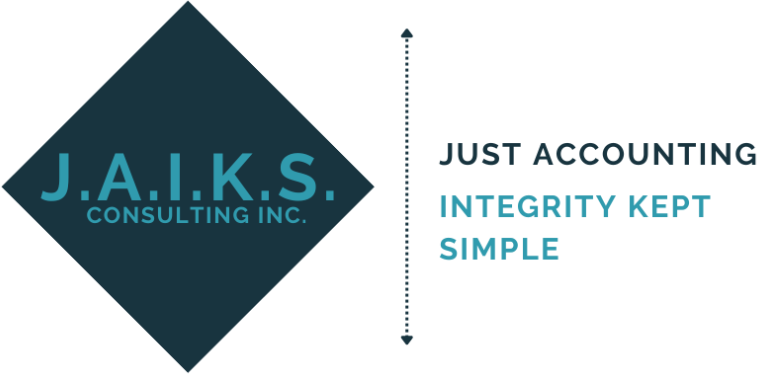J.A.I.K.S. BLOG
Welcome to J.A.I.K.S. Blog, a place where we will provide you with a variety of resources on accounting, taxation and other related subjects suited for both individuals and/or their businesses.
We hope you can find the answers to your questions and/or curiosities, and always know we are here to help if you need more.
Follow us on Facebook or find us on LinkedIn - we are always eager to give you more!
Disclaimer:
The content provided in this blog is for general informational purposes only and is not intended as professional accounting, tax, or financial advice. While efforts are made to ensure the accuracy and timeliness of the content, errors or omissions may occur. The content does not constitute a client-advisor relationship. Readers should consult with a Chartered Professional Accountants or other financial professional for advice tailored to their specific needs. We are not liable for any actions one might take based on the information provided in this blog.
3 minutes reading time
(677 words)
What Age I Should Start Taking CPP?
The age at which you should start taking Canada Pension Plan (CPP) benefits depends on your personal financial situation, health, and retirement plans. You can begin taking CPP anytime between age 60 and 70, but the timing significantly impacts your monthly payments.
Here’s a breakdown of the key factors to consider:
- Key Points About CPP
- Standard Retirement Age:
- The default age to start CPP is 65. At this age, you’ll receive your base amount based on your contributions and how many years you worked.
- Early CPP (Age 60–64):
- If you take CPP before 65, your payments will be reduced by 0.6% per month (7.2% per year) for each month before your 65th birthday.
- If you start at 60, the total reduction will be 36% of your base payment.
- Standard Retirement Age:
Why take CPP early?
- You need income now and can’t wait until 65.
- You have health concerns or a shorter life expectancy.
- You want to enjoy retirement while you’re still active.
Delayed CPP (Age 65–70):
If you delay CPP past 65, your payments will increase by 0.7% per month (8.4% per year) for each month after your 65th birthday.
If you start at 70, the total increase will be 42% of your base payment.
Why delay CPP?
- You have other income sources and don’t need CPP immediately.
- You’re in good health and expect a longer life expectancy.
- You want to maximize your lifetime payments if you live beyond your late 70s.
Monthly CPP Payment Examples
Let’s say your base CPP benefit at age 65 is $1,000/month:
- Start at 60: $1,000 - 36% = $640/month.
- Start at 65: $1,000/month.
- Start at 70: $1,000 + 42% = $1,420/month.
When to Take CPP: Factors to Consider
- Life Expectancy:
- If you expect to live into your late 70s or beyond, delaying CPP often results in higher lifetime benefits.
- If you have health issues and a shorter life expectancy, starting early might make more sense.
- Current Financial Needs:
- If you need income to cover expenses or reduce withdrawals from your savings (e.g., RRSP or TFSA), you might consider starting CPP earlier.
- Other Income Sources:
- If you have a workplace pension, RRIF, or other savings, you may not need CPP right away and could benefit from delaying it for larger payments later.
- Investment Opportunity:
- If you start CPP early and invest the payments, you might achieve higher returns than delaying CPP (depending on market performance).
Tax Implications:
CPP is taxable income. If you’re working or have other sources of income, starting CPP early could push you into a higher tax bracket.
Break-Even Age
The “break-even age” is when the total payments you would receive by delaying CPP surpass the total payments you’d receive by starting early.
Typically, the break-even age is around age 74–77, depending on your specific situation.
If you live beyond this, delaying CPP may pay off; if you don’t, starting earlier may be better.
General Recommendations
Take CPP Early (60–64):
- You need the income immediately.
- You have health issues or a shorter life expectancy.
- You’re retiring early and want to maintain your lifestyle.
Take CPP at 65:
You’re in average health and don’t have strong financial reasons to start early or delay.
Delay CPP (65–70):
- You’re in good health with a long life expectancy.
- You don’t need the income right away.
- You want to maximize your payments and future financial security.
Do you plan to invest your early CPP payments, or would you spend them immediately? If investing, we can analyze your tax situation and factor in an annual return percentage to see if it makes sense for you to do so. Contact our office for an appointment to find out.
Where you decide to continue working past the age of 65, you can still optionally contribute to your CPP account up to age 70 to receive an increased pension based on the extended contributions between 66 and 70 years of age.
To ensure you're making the right decision about when to start drawing CPP, contact our office so we can review your particular circumstances and advise you of the most beneficial strategy.
Stay Informed
When you subscribe to the blog, we will send you an e-mail when there are new updates on the site so you wouldn't miss them.


Comments